China Brands, Marketing & Consumers
Mamianqun Gate: Dior Accused of Cultural Appropriation for Copying Design of Traditional Chinese Skirt
This is not just a matter of plagiarism, according to some, it’s about Dior taking a traditional Chinese design and claiming it’s theirs.
Published
3 years agoon
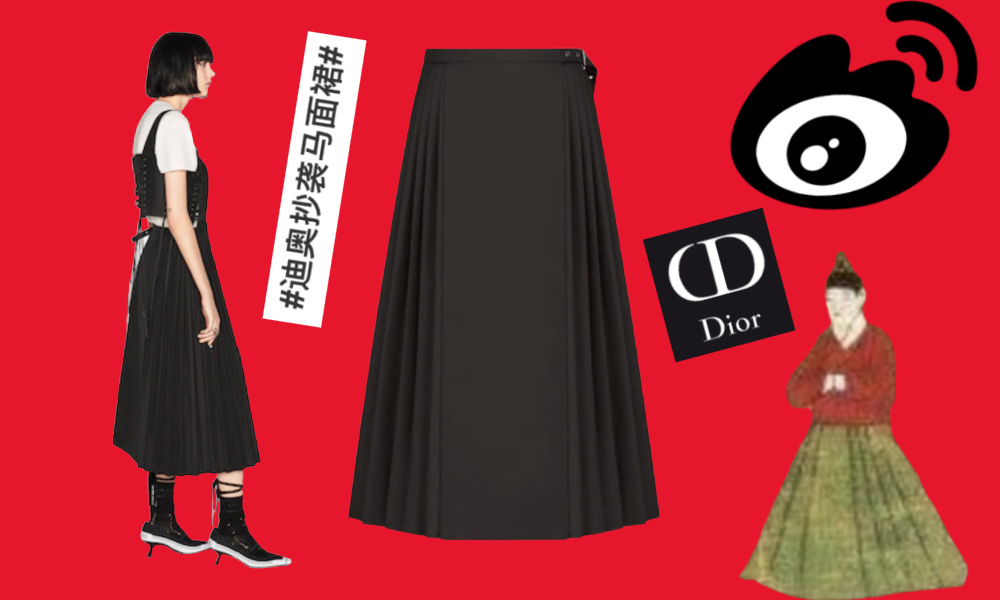
This article was first published by What’s on Weibo on
French luxury fashion house Dior has come under fire on Chinese social media today for the design of one of the skirts in its 2022 Fall collection, which resembles a Chinese traditional skirt known as mǎmiànqún (马面裙).
On the Chinese version of the Dior official website, the French fashion brand describes it as a “mid-length skirt” that is an “all-new elegant and stylish piece based on the iconic Dior silhouette.”
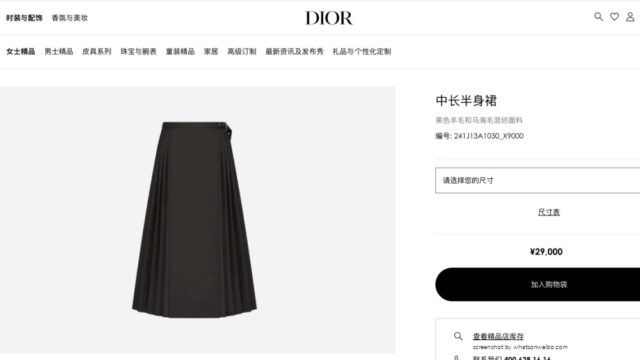
But many Chinese netizens do not agree, and say that the pleated skirt in question is actually a mǎmiànqún (马面裙): a wrapped, apron-like traditional Chinese skirt that was worn in China as early as the Song (960–1279) and Liao dynasties (916–1125) and became popular during the Ming Dynasty (1368-1644).
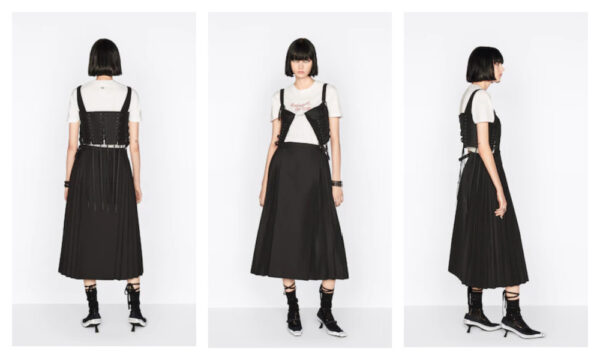
The skirt by Dior.
The literal translation of the word mǎmiànqún is ‘horse face skirt.’ The skirt is composed of two overlapping fabrics wrapped around the lower body: the two sides of the skirt are pleated, and there is a smooth section in the middle. The skirt is also known as mǎmiànzhěqún (马面褶裙), ‘horse face pleated skirt.’
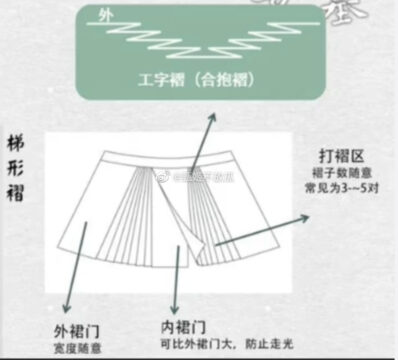
“It’s just exactly the same,” some commenters wrote. “They’re copying China and then selling it to Chinese consumers, I don’t know what to say.” On the Chinese official Dior site, the skirt is priced at 29,000 yuan (US$4292).
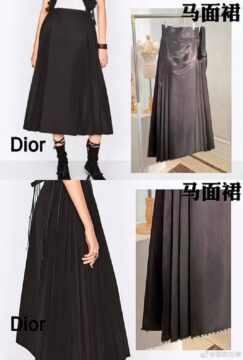
The Dior skirt on the left, Chinese mamian skirt on the right, image from Weibo.
“They’re vilifying China and at the same time, they’re stealing from Chinese culture. They’re shameless,” one Weibo user (@改改hj) wrote.
“Can’t the propaganda department set up an organization to defend our legal rights?” other commenters write.
The influential history blogging account @Qinyimo (@秦祎墨, over 7 million fans) wrote: “I’m not even kidding. I hope that a lawyer specialized in copyright law and an expert in cultural preservation will jointly evaluate this matter, and pay attention to how nasty this is.”
Some people are especially offended that Dior suggests the skirt’s design is inspired by their own original Christian Dior skirt, without any reference to China at all. Others foresee greater problems for Chinese traditional dress if Dior is actually claiming this design is theirs.
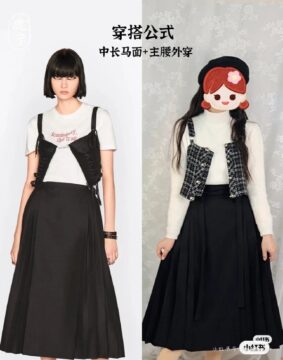
Side by side comparison of Dior’s skirt and mamianqun.
The blogging account Qinyimo raised attention to this potential problem.
“This is not simply a matter of plagiarism,” they write: “As traditional Chinese apparel, the mamianqun has historical origins in the Chinese traditional dress system which has continued to the present-day and has never been discontinued. If Dior has patented the version of their mamianqun design, this would mean that when the Chinese fashion industry uses this traditional technique, they could end up in an international legal dispute for doing so.”
“What is ours is ours, I am confident about that. But if their patent is approved, it would mean our way out is blocked (..) This is not a joke, this requires serious attention.”
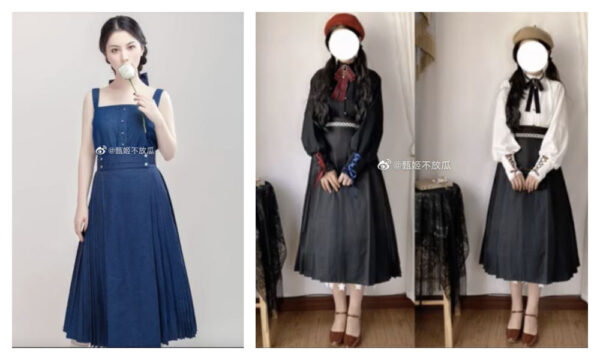
Mamianqun examples shared on Weibo.
Chinese traditional dress is increasingly popular among Chinese young people, especially due to the rise of the Hanfu Movement, which can be described as a social movement that supports the wearing of Han Chinese ethnic clothing (read more here).
“Dior, this is blatant cultural appropriation [文化挪用],” one Weibo user writes, receiving nearly 12,000 likes on their comment.
At the same time, not everyone agrees that Dior is guilty of plagiarism: “It’s not plagiarism, don’t be mistaken, the mamian skirt is not protected by copyright law so you can’t really plagiarize it. It is, however, 100% cultural appropriation.”
“They are misappropriating our traditional apparel,” other commenters write.
It is not the first time for a Western luxury fashion brand to ignite controversy in China. In 2018, Italian fashion house D&G faced consumer outrage and backlash on Chinese social media for a marketing campaign featuring a Chinese-looking model clumsily using chopsticks to eat Italian dishes (read more here). Various other brands, including Versace and Givenchy, also came under fire in 2019 for for listing Hong Kong, Macau, and Taiwan as a separate countries or regions – not part of China – on their official websites or brand T-shirts.
However, it is rare for online controversies to come out in China accusing foreign brands of ‘cultural appropriation.’ In the past, China has been accused of cultural appropriation, especially when it comes to Korean traditions. Earlier this year, a performer at the opening ceremony of the Beijing Olympics drew condemnation in South Korea for wearing a traditional Korean dress known as hanbok.
Although ‘cultural appropriation’ is at the center of today’s discussions, it is arguably a bit more nuanced than previous mainstream discussions regarding the issue of cultural appropriation outside of China. More than feeling offended about Dior using Chinese mamianqun design, it is about Dior claiming the design as being based on their own original classic. As one netizen writes: “Let’s not be misunderstood, it’s useless to talk about ‘cultural appropriation’ [文化挪用], we need to let people know that in the future if they’ll wear a mamianqun, they could be told by foreigners that ‘Chinese people just love to wear big fashion brands rip offs .’ When our own international clothing brands use our own mamian skirt elements, it is likely they’ll be sued by Dior for doing so.”
At time of writing, the official Dior Weibo account has not responded to the controversy. They have, however, turned off the comment sections of their latest posts.
By Manya Koetse
Get the story behind the hashtag. Subscribe to What’s on Weibo here to receive our weekly newsletter and get access to our latest articles:
Spotted a mistake or want to add something? Please let us know in comments below or email us. First-time commenters, please be patient – we will have to manually approve your comment before it appears.
©2022 Whatsonweibo. All rights reserved. Do not reproduce our content without permission – you can contact us at info@whatsonweibo.com.
Manya is the founder and editor-in-chief of What's on Weibo, offering independent analysis of social trends, online media, and digital culture in China for over a decade. Subscribe to gain access to content, including the Weibo Watch newsletter, which provides deeper insights into the China trends that matter. More about Manya at manyakoetse.com or follow on X.

China Arts & Entertainment
Controversial Wanghong Livestreamers Are Becoming a Weibo Staple in China
‘Wanghong’ was a mark of online fame; now, it’s increasingly tied to controversy and scandal.
Published
6 months agoon
October 27, 2024
As livestreaming continues to gain popularity in China, so do the controversies surrounding the industry. Negative headlines involving high-profile livestreamers, as well as aspiring influencers hoping to make it big, frequently dominate Weibo’s trending topics.
These headlines usually revolve around China’s so-called wǎnghóng (网红) influencers. Wanghong is a shortened form of the phrase “internet celebrity” (wǎngluò hóngrén 网络红人). The term doesn’t just refer to internet personalities but also captures the viral nature of their influence—describing content or trends that gain rapid online attention and spread widely across social media.
Recently, an incident sparked debate over China’s wanghong livestreamers, focusing on Xiaohuxing (@小虎行), a streamer with around 60,000 followers on Douyin, who primarily posts evaluations of civil aviation services in China.

Xiaohuxing (@小虎行)
On October 15, 2024, at Shenzhen Bao’an International Airport, Xiaohuxing confronted a volunteer at the automated check-in counter, insisting she remove her mask while livestreaming the entire encounter. He was heard demanding, “What gives you the right to wear a mask? What gives you the right not to take it off?” and even attempted to forcibly remove her mask, challenging her to call the police.

During the livestream, the livestreamer confronted the woman on the right for wearing a facemask.
He also argued with a male traveler who tried to intervene. In the end, the airport’s security officers detained him. Shortly after the incident, a video of the livestream went viral on Weibo under various hashtags (e.g. #网红小虎行机场强迫志愿者摘口罩#) and attracted millions of views. The following day, Xiaohuxing’s Douyin account was banned, and all his videos were removed. The Shenzhen Public Security Bureau later announced that the account’s owner, identified as Wang, had been placed in administrative detention.
On October 13, just days before, another livestreaming controversy erupted at Guangzhou Baiyun International Airport. Malatang (@麻辣烫), a popular Douyin streamer with over a million followers, secretly filmed a young couple kissing and mocked them, continuing to film while passing through security—an area where filming is prohibited.
Her livestream quickly went viral, sparking discussions about unauthorized filming and misconduct among Chinese wanghong. In response, Malatang’s agent posted an apology video. However, the affected couple hired a lawyer and reported the incident to the police (#被百万粉丝网红偷拍当事人发声#). On October 17, Malatang’s Douyin account was banned, and her videos were removed.
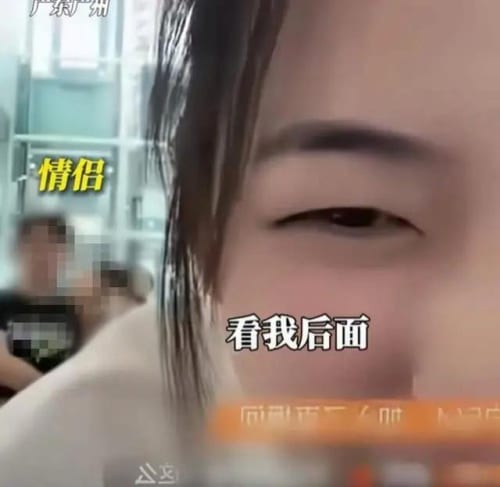
Livestreamer Malatang making fun of the couple in the back at the airport.
In both cases, netizens uncovered additional examples of inappropriate behavior by Xiaohuxing and Malatang in past broadcasts. For example, Xiaohuxing was reportedly aggressive towards a flight attendant, demanding she kneel to serve him, while Malatang was criticized for scolding a delivery person who declined to interact with her on camera.
Comments on Weibo included, “They’ll do anything for traffic. Wanghong are getting a bad reputation because of people like this.” Another added, “It seems as if ‘wanghong’ has become a negative term now.”
Rising Scrutiny in China’s Wanghong Economy
Xiaohuxing and Malatang are far from isolated cases. Recently, many other wanghong livestreamers have also been caught up in negative news.
One such figure is Dong Yuhui (董宇辉), a former English teacher at New Oriental (新东方) who transitioned to livestreaming for East Buy (东方甄选), where he mixed education with e-commerce (read here). Dong gained significant popularity and boosted East Buy’s brand before leaving to start his own company. Recently, however, Dong faced backlash for inaccurate statements about Marie Curie during an October 9 livestream. He incorrectly claimed that Curie discovered uranium, invented the X-ray machine, and won the Nobel Prize in Literature, among other things.
Considering his public image as a knowledgeable “teacher” livestreamer, this incident sparked skepticism among viewers about his actual expertise. A related hashtag (#董宇辉称居里夫人获得诺贝尔文学奖#) garnered over 81 million views on Weibo. In addition to this criticism, Dong is also being questioned about potential false advertising, which is a major challenge for all livestreamers selling products during their streams.

Dong Yuhui (董宇辉) during one of his livestreams.
Another popular livestreamer, Dongbei Yujie (@东北雨姐), is currently also facing criticism over product quality and false advertising claims. Originally from Northeast China, Dongbei Yujie shares content focused on rural life in the region. Recently, her Douyin account, which boasts an impressive 22 million followers, was muted due to concerns over the quality of products she promoted, such as sweet potato noodles (which reportedly contained no sweet potato). Despite issuing public apologies—which have garnered over 160 million views under the hashtag “Dongbei Yujie Apologizes” (#东北雨姐道歉#)—the controversy has impacted her account and led to a penalty of 1.65 million yuan (approximately 231,900 USD).

From Dongbei Yujie’s apology video
Former top Douyin livestreamer Fengkuang Xiaoyangge (@疯狂小杨哥) is also facing a career downturn. Leading up to the 2024 Mid-Autumn Festival, he promoted Hong Kong Meicheng mooncakes in his livestreams, branding them as a high-end Hong Kong product. However, it was soon revealed that these mooncakes had no retail presence in Hong Kong and were primarily produced in Guangzhou and Foshan, sparking accusations of deceptive marketing. Due to this incident and previous cases of misleading advertising, his company came under investigation and was penalized. In just a few weeks, Fengkuang Xiaoyangge lost over 8.5 million followers (#小杨哥掉粉超850万#).

Fengkuang Xiaoyangge (@疯狂小杨哥) and the mooncake controversy.
It’s not only ecommerce livestreamers who are getting caught up in scandal. Recently, the influencer “Xiaoxiao Nuli Shenghuo” (@小小努力生活) and her mother were arrested for fabricating a tragic story – including abandonment, adoption, and hardships – to gain sympathy from over one million followers and earn money through donations and sales. They, and two others who helped them manage their account, were sentenced to ten days in prison for ‘false advertising.’
Wanghong Fame: Opportunity and Risk
China’s so-called ‘wanghong economy’ has surged in recent years, with countless content creators emerging across platforms like Douyin, Kuaishou, and Taobao Live. These platforms have transformed interactions between content creators and viewers and changed how products are marketed and sold.
For many aspiring influencers, becoming a livestreamer is the first step to building a presence in the streaming world. It serves as a gateway to attracting traffic and potentially monetizing their online influence.
However, before achieving widespread fame, some livestreamers resort to using outrageous or even offensive content to capture attention, even if it leads to criticism. For example, before his account was banned, Xiaohuxing set his comment section to allow only followers to comment, gaining 3,000 new followers after his controversial livestream at Shenzhen Airport went viral. Many speculated that some followers joined just to leave critical comments, but it nonetheless grew his following.
As livestreamers gain significant fame, they must exercise greater caution, as they often hold substantial influence over their audiences, making accuracy essential. Mistakes, whether intentional or not, can quickly erode trust, as seen in the example of the super popular Dong Yuhui, who faced backlash after his inaccurate comment about Marie Curie sparked public criticism.
China’s top makeup livestreamer, Li Jiaqi (李佳琦), experienced a similar reputational crisis in September last year. Responding dismissively to a viewer who commented on the high price of an eyebrow pencil, Li replied, “Have you received a raise after all these years? Have you worked hard enough?” Commentators pointed out that the pencil’s cost per gram was double that of gold at the time. Accused of “forgetting his roots” as a former humble salesman, Li lost one million Weibo followers in a day (read more here).
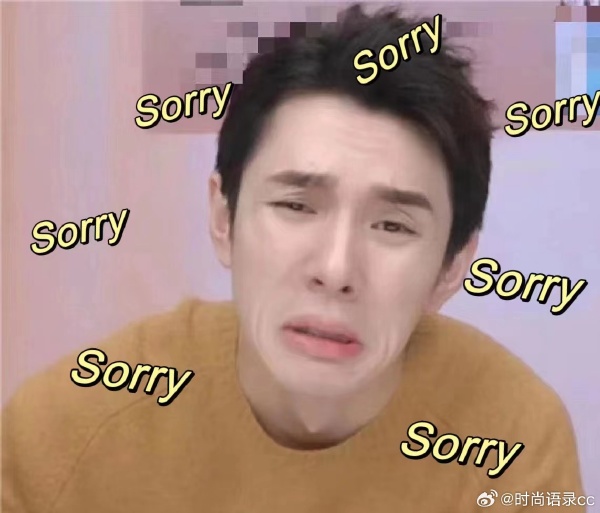
This meme shows that many viewers did not feel moved by Li’s apologetic tears after the eyepencil incident.
Despite the challenges and risks, becoming a wanghong remains an attractive career path for many. A mid-2023 Weibo survey on “Contemporary Employment Trends” showed that 61.6% of nearly 10,000 recent graduates were open to emerging professions like livestreaming, while 38.4% preferred more traditional career paths.
Taming the Wanghong Economy
In response to the increasing number of controversies and scandals brought by some wanghong livestreamers, Chinese authorities are implementing stricter regulations to monitor the livestreaming industry.
In 2021, China’s Propaganda Department and other authorities began emphasizing the societal influence of online influencers as role models. That year, the China Association of Performing Arts introduced the “Management Measures for the Warning and Return of Online Hosts” (网络主播警示与复出管理办法), which makes it challenging, if not impossible, for “canceled” celebrities to stage a comeback as livestreamers (read more).
The Regulation on the Implementation of the Law of the People’s Republic of China on the Protection of Consumer Rights and Interests (中华人民共和国消费者权益保护法实施条例), effective July 1, 2024, imposes stricter rules on livestream sales. It requires livestreams to disclose both the promoter and the product owner and mandates platforms to protect consumer rights. In cases of illegal activity, the platform, livestreaming room, and host are all held accountable. Violations may result in warnings, confiscation of illegal earnings, fines, business suspensions, or even the revocation of business licenses.
These regulations have created a more controlled “wanghong” economy, a marked shift from the earlier, more unregulated era of livestreaming. While some view these measures as restrictive, many commenters support the tighter oversight.
A well-known Kuaishou influencer, who collaborates with a person with dwarfism, recently faced backlash for sharing “vulgar content,” including videos where he kicks his collaborator (see video) or stages sensational scenes just for attention.
Most commenters welcome the recent wave of criticism and actions taken against such influencers, including Xiaohuxing and Dongbei Yujie, for their behavior. “It’s easy to become famous and make money like this,” commenters noted, adding, “It’s good to see the industry getting cleaned up.”
State media outlet People’s Daily echoed this sentiment in an October 21 commentary, stating, “No matter how many fans you have or how high your traffic is, legal lines must not be crossed. Those who cross the red line will ultimately pay the price.”
This article and recent incidents have sparked more online discussions about the kind of influencers needed in the livestreaming era. Many suggest that, beyond adhering to legal boundaries, celebrity livestreamers should demonstrate a higher moral standard and responsibility within this digital landscape. “We need positive energy, we need people who are authentic,” one Weibo user wrote.
Others, however, believe misbehaving “wanghong” livestreamers naturally face consequences: “They rise fast, but their popularity fades just as quickly.”
When asked, “What kind of influencers do we need?” one commenter responded, “We don’t need influencers at all.”
By Wendy Huang
Follow @whatsonweibo
Edited for clarity by Manya Koetse
Spotted a mistake or want to add something? Please let us know in comments below or email us. Please note that your comment below will need to be manually approved if you’re a first-time poster here.
©2024 Whatsonweibo. All rights reserved. Do not reproduce our content without permission – you can contact us at info@whatsonweibo.com
China Books & Literature
Why Chinese Publishers Are Boycotting the 618 Shopping Festival
Bookworms love to get a good deal on books, but when the deals are too good, it can actually harm the publishing industry.
Published
10 months agoon
June 8, 2024By
Ruixin Zhang
JD.com’s 618 shopping festival is driving down book prices to such an extent that it has prompted a boycott by Chinese publishers, who are concerned about the financial sustainability of their industry.
When June begins, promotional campaigns for China’s 618 Online Shopping Festival suddenly appear everywhere—it’s hard to ignore.
The 618 Festival is a product of China’s booming e-commerce culture. Taking place annually on June 18th, it is China’s largest mid-year shopping carnival. While Alibaba’s “Singles’ Day” shopping festival has been taking place on November 11th since 2009, the 618 Festival was launched by another Chinese e-commerce giant, JD.com (京东), to celebrate the company’s anniversary, boost its sales, and increase its brand value.
By now, other e-commerce platforms such as Taobao and Pinduoduo have joined the 618 Festival, and it has turned into another major nationwide shopping spree event.
For many book lovers in China, 618 has become the perfect opportunity to stock up on books. In previous years, e-commerce platforms like JD.com and Dangdang (当当) would roll out tempting offers during the festival, such as “300 RMB ($41) off for every 500 RMB ($69) spent” or “50 RMB ($7) off for every 100 RMB ($13.8) spent.”
Starting in May, about a month before 618, the largest bookworm community group on the Douban platform, nicknamed “Buying Like Landsliding, Reading Like Silk Spinning” (买书如山倒,看书如抽丝), would start buzzing with activity, discussing book sales, comparing shopping lists, or sharing views about different issues.

Social media users share lists of which books to buy during the 618 shopping festivities.
This year, however, the mood within the group was different. Many members posted that before the 618 season began, books from various publishers were suddenly taken down from e-commerce platforms, disappearing from their online shopping carts. This unusual occurrence sparked discussions among book lovers, with speculations arising about a potential conflict between Chinese publishers and e-commerce platforms.
A joint statement posted in May provided clarity. According to Chinese media outlet The Paper (@澎湃新闻), eight publishers in Beijing and the Shanghai Publishing and Distribution Association, which represent 46 publishing units in Shanghai, issued a statement indicating they refuse to participate in this year’s 618 promotional campaign as proposed by JD.com.
The collective industry boycott has a clear motivation: during JD’s 618 promotional campaign, which offers all books at steep discounts (e.g., 60-70% off) for eight days, publishers lose money on each book sold. Meanwhile, JD.com continues to profit by forcing publishers to sell books at significantly reduced prices (e.g., 80% off). For many publishers, it is simply not sustainable to sell books at 20% of the original price.
One person who has openly spoken out against JD.com’s practices is Shen Haobo (沈浩波), founder and CEO of Chinese book publisher Motie Group (磨铁集团). Shen shared a post on WeChat Moments on May 31st, stating that Motie has completely stopped shipping to JD.com as it opposes the company’s low-price promotions. Shen said it felt like JD.com is “repeatedly rubbing our faces into the ground.”
Nevertheless, many netizens expressed confusion over the situation. Under the hashtag topic “Multiple Publishers Are Boycotting the 618 Book Promotions” (#多家出版社抵制618图书大促#), people complained about the relatively high cost of physical books.
With a single legitimate copy often costing 50-60 RMB ($7-$8.3), and children’s books often costing much more, many Chinese readers can only afford to buy books during big sales. They question the justification for these rising prices, as books used to be much more affordable.
Book blogger TaoLangGe (@陶朗歌) argues that for ordinary readers in China, the removal of discounted books is not good news. As consumers, most people are not concerned with the “life and death of the publishing industry” and naturally prefer cheaper books.
However, industry insiders argue that a “price war” on books may not truly benefit buyers in the end, as it is actually driving up the prices as a forced response to the frequent discount promotions by e-commerce platforms.
China News (@中国新闻网) interviewed publisher San Shi (三石), who noted that people’s expectations of book prices can be easily influenced by promotional activities, leading to a subconscious belief that purchasing books at such low prices is normal. Publishers, therefore, feel compelled to reduce costs and adopt price competition to attract buyers. However, the space for cost reduction in paper and printing is limited.
Eventually, this pressure could affect the quality and layout of books, including their binding, design, and editing. In the long run, if a vicious cycle develops, it would be detrimental to the production and publication of high-quality books, ultimately disappointing book lovers who will struggle to find the books they want, in the format they prefer.
This debate temporarily resolved with JD.com’s compromise. According to The Paper, JD.com has started to abandon its previous strategy of offering extreme discounts across all book categories. Publishers now have a certain degree of autonomy, able to decide the types of books and discount rates for platform promotions.
While most previously delisted books have returned for sale, JD.com’s silence on their official social media channels leaves people worried about the future of China’s publishing industry in an era dominated by e-commerce platforms, especially at a time when online shops and livestreamers keep competing over who has the best book deals, hyping up promotional campaigns like ‘9.9 RMB ($1.4) per book with free shipping’ to ‘1 RMB ($0.15) books.’
This year’s developments surrounding the publishing industry and 618 has led to some discussions that have created more awareness among Chinese consumers about the true price of books. “I was planning to bulk buy books this year,” one commenter wrote: “But then I looked at my bookshelf and saw that some of last year’s books haven’t even been unwrapped yet.”
Another commenter wrote: “Although I’m just an ordinary reader, I still feel very sad about this situation. It’s reasonable to say that lower prices are good for readers, but what I see is an unfavorable outlook for publishers and the book market. If this continues, no one will want to work in this industry, and for readers who do not like e-books and only prefer physical books, this is definitely not a good thing at all!”
By Ruixin Zhang, edited with further input by Manya Koetse
Independently reporting China trends for over a decade. Like what we do? Support us and get the story behind the hashtag by subscribing:
Spotted a mistake or want to add something? Please let us know in comments below or email us. First-time commenters, please be patient – we will have to manually approve your comment before it appears.
©2024 Whatsonweibo. All rights reserved. Do not reproduce our content without permission – you can contact us at info@whatsonweibo.com.
Subscribe

China Reacts: 3 Trending Hashtags Shaping the Tariff War Narrative

No Quiet Qingming: From High-Tech Tomb-Sweeping to IShowSpeed & the Seven China Streams

From Trade Crisis to Patriotic Push: Chinese Online Reactions to Trump’s Tariffs

China Trending Week 14: Gucci Fake Lipstick, Xiaomi SU7 Crash, Yoon’s Impeachment

Strange Encounter During IShowSpeed’s Chengdu Livestream

“Dear Li Hua”: The TikTok/Xiaohongshu Honeymoon Explained

Beyond the Box Office: What’s Behind Ne Zha 2’s Success?

Weibo Watch: A New Chapter

15 Years of Weibo: The Evolution of China’s Social Media Giant

Tuning Into the Year of the Snake

IShowSpeed in China: Streaming China’s Stories Well

TikTok Refugees, Xiaohongshu, and the Letters from Li Hua

The ‘China-chic Girl’ Image and the Realities of China’s Competitive Food Delivery Market

“Black Myth: Wukong”: From Gaming Screens to the CMG Spring Festival Gala?

US-Russia Rapprochement and “Saint Zelensky”: Chinese Online Reactions to Trump’s Shake-Up
Get in touch
Would you like to become a contributor, or do you have any tips or suggestions? Get in touch here!
Popular Reads
-

 China Insight11 months ago
China Insight11 months agoThe Tragic Story of “Fat Cat”: How a Chinese Gamer’s Suicide Went Viral
-

 China Digital10 months ago
China Digital10 months agoChina’s 2024 Gaokao Triggers Online Discussions on AI
-

 China Arts & Entertainment11 months ago
China Arts & Entertainment11 months agoSinging Competition or Patriotic Fight? Hunan TV’s ‘Singer 2024’ Stirs Nationalistic Sentiments
-

 China Arts & Entertainment12 months ago
China Arts & Entertainment12 months ago“Old Bull Eating Young Grass”: 86-Year-Old Chinese Painter Fan Zeng Marries 36-Year-Old Xu Meng






Jane Churchland
July 16, 2022 at 2:12 am
I may be missing something, but the photos and description look nearly exactly the same as the winter school uniform kilt I (and thousands upon thousands of others of Australian school girls) wore decades ago? Different fabric, but same design? A pleated wrap with a smooth front panel?
I agree that Dior claiming it’s something special is weird, but saying it’s culturally appropriated from a Chinese garment doesn’t add up to me.
Beefnoodles
July 16, 2022 at 2:46 am
It is not about the “Pleats”, which seems a familiar element of style in school uniform. However, the Chinese traditional skirt (mamianqun) have two layers of cloth overlapping each other, which is different from the skirt we wear nowadays. Why is it called a mamianqun (horse face skirt), it is because the shape of the skirt resembles the one side of the rampart in ancient city of China, which is called “the side of a horse face”. Why is it designed this way? Because, in ancient times, we don’t have zippers, elastic cords or Velcro to avoid exposure of private parts; Therefore, Chinese people have to wear a lot, so the multi-layered design makes the skirt breathable, and the pleats it utilized makes the skirt more comfortable when the skirt is swinging back and forth. China is, admittedly, a civilization with a discontinued history. Its culture has to be acknowledged. What Dior has done is offensive and disrespectful.
K
July 16, 2022 at 2:50 am
It’s the cultural appropriation; the article explained the structure of the apron-like traditional Chinese skirt, and this new Dior dress uses the almost same… They are not only similar in outlook
Beefnoodles
July 16, 2022 at 2:50 am
Chine is a civilization with continued history.
noodles
July 16, 2022 at 3:07 am
It is not about the “Pleats”, Which seems a familiar element of style in school uniform.
However, the Chinese traditional skirt (mamiangun) have two layers of cloth
overlapping each other, which is different from the skirt we wear nowadays. Why is it
called a mamiangun (horse face skirt), it is because the shape of the skirt resembles
the one side of the rampart in ancient city of China, which is called “the side of a horse
face”. Why is it designed this way? Because, in ancient times, we don’t have zippers,
elastic cords or Velcro to avoid exposure of private parts; Therefore, Chinese people
have to wear a lot, so the multi-layered design makes the skirt breathable, and the
pleats it utilized makes the skirt more comfortable when the skirt is swinging back and
forth. China is, admittedly, a civilization with a long, continued history. Its culture has to
be acknowledged. What Dior has done is offensive and disrespectful.
Even Princess Diana has wore a red mamianqun in 1981.
Yiran Sun
July 16, 2022 at 4:14 am
You are missing something. The the Dior skirt is open on both sides, and when untied it’s one piece of fabric, the specific construction is exactly, uniquely like mamianqun, even down to the specific placement of the pleats.
All tradition Chinese skirts are actually one piece of fabric tied together with ribbons on both sides, because you are expected to wear pants underneath it. Mamianqun was developed to open on both sides so women can more easily ride horses. Are horses the primary form of transportation for Australian school girls these days?
Kim_YS
July 16, 2022 at 10:09 am
This isn’t Chinese origin, this is Korean origin according to Chinese’s own written records. There’s Goguryeo mural painting showing this outskirt.
Keesty
July 18, 2022 at 11:30 pm
Mamian is from China. It’s the main dress for our female Han people in the Song and Ming dynasties (nearly 700 years of history). Why do Korean people always try to steal other people’s culture? If you know your history. You will find out the Korean peninsula is independent only after , in 1895. You used to belong to the Chinese dynasty. I don’t think any Chinese people will want to wear any clothes from your region rather than our clothes. I can show respect to Korean, but only as you show respect to the real history.
Zeus
July 19, 2022 at 3:15 am
Check this video: “Dior and Its Cultural Appropriation of Chinese Ma Mian Skirt [CC]” (https://youtu.be/Chyma67-PMY), which explained clearly the unique design of the Ma Mian Qun (Horse face skirt). As mentioned above, this is not about “pleats”. The design of Ma Mian Qun made it easier for ancient Chinese women to ride horses, unlike that of the Western women, who did side saddle riding. What Dior does is blatant cultural appropriation.
Jane Churchland
July 19, 2022 at 9:07 am
OK, I’ve now seen a closer look video on the actual skirt, and you are all right and I was so extremely wrong. My apologies.
Guy
July 20, 2022 at 4:02 pm
Chinese copy everything. And they have the nerve to complain?
Walao
July 21, 2022 at 2:47 pm
Without fail, a korean will always show up to claim some heritage that’s obviously not theirs.
Whatdli
July 24, 2022 at 12:40 pm
Dont understand why is okeay to people copy original work from Chinese even there is people who copy other people. But if you didnt know all world have plagiarize problem, not only China. But China get promote for most about this. Not saying its fine, but this cultural appropriation is just wrong thing as well as those people from China who make fake things. There are original designers and traditional culture, which we should support. They should all be respected, otherwise everyone is no different from someone who can only plagiarized.
Whatif
July 24, 2022 at 12:44 pm
If people thing its fine because there are Chinese who copy and say they cant complain when they get this. Would you prefer that in the future copying be increased in China and maybe they also think that it is the only way to act when the original work or culture cannot be protected or complain that it has been copied.
Its fin
July 24, 2022 at 12:47 pm
Can Korean people just stop whe know ypu can not read Chinese character, ypu can even not make difference between horsetail and horseface. And no there is not a tomb info about it, because you people broke mural painting when try to steal it.
Sisi
July 30, 2022 at 3:40 am
China’s history definitely been interrupted when they were forced to wear that long braid.
Sisi
July 30, 2022 at 3:44 am
Dior only mentioned their classic silhouette, took no credit for the pleats and cut. Can people have an idea of silhouette before accusing others?